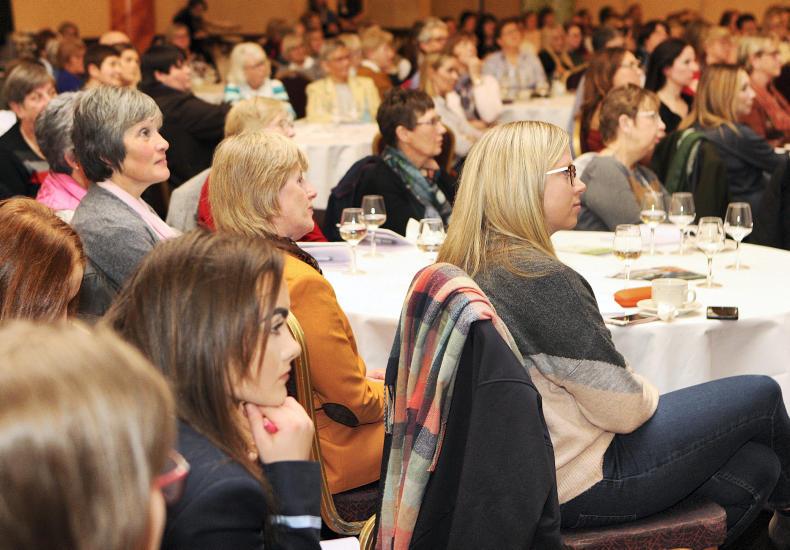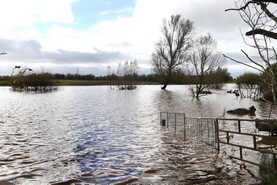Businesses that have encouraged gender diversity right up to senior management positions are more successful, and the same principle applies to the farming industry, attendees at last weeks’ UFU Women in Agriculture conference were told.
In her keynote address, Scottish livestock farmer Joyce Bannerman Campbell came with a challenge, both for those men currently in leadership roles, but also women working in agriculture who have tended to remain in the background.
“I find it most sad when women tell me that ‘I just do the books or I just make the dinner’. Believe in yourself, don’t be knocked by naysayers. Why sit in the corner like a wilting flower? Take your opportunities – go to meetings, learn something else,” she said.
In an open and honest assessment of her experiences as a farmer, Bannerman Campbell, who runs 800 ewes and 25 sucklers on a 5,822 acre hill farm in north Sutherland, said that sometimes she has received criticism from both men and women for expressing her views.
But she has remained steadfast that when it comes to running a farm business, she deserves to be recognised as an equal alongside any male counterpart.
However, her most pointed criticism came for farm lobby organisations such as NFU Scotland, which are traditionally dominated by men.
“We need to get in the room as women, and the room needs to be receptive to us as well. We have not been allowed in the room sometimes,” she suggested.
In 2017, she was asked to co-chair a Women in Agriculture taskforce alongside Scottish rural economy secretary Fergus Ewing, to look in-depth at issues around succession planning, training and progression for women within the industry.
The taskforce produced an interim report in 2018, and a final report is due out next week. In 2018, the Scottish government also made £250,000 available to help deliver appropriate training, and develop a Charter for businesses and organisations with the aim to involve more women at all levels.
Changes
In NI, while we do have more women coming through in agricultural education, advisory roles, and within business, it is in farm organisations where the numbers are lacking.
“There are big changes coming down the track for agriculture, and we need more women to become more actively involved,” noted UFU president Ivor Ferguson in his opening remarks to the conference.
Merit
Also commenting during a panel discussion, YFCU president Zita McNaugher pointed out that nearly half of the students at Greenmount are now female, so more young women are seeing agriculture as a viable career. She also maintained that there is a growing realisation within the farming community that if you have a daughter, “it is not the end of the world”.
So while women might still be under-represented, there is a change happening, said McNaugher.
However, she does not want to see women put on to committees and into leadership roles just as some form of token gesture.
“We don’t just want to be making up the numbers – we have got to be there on merit. It is massively important females are there on merit,” she said.
Bridging the gap to consumers
The other keynote speaker at the UFU Women in Agriculture conference was Hannah Jackson, a north of England sheep farmer who has established the brand The Red Shepherdess.
Growing up in a town, and with a degree in animal behaviour, Jackson first saw a lamb born in 2013, and realised a career in the sheep industry was something she wanted to pursue.
She now works as a contract shepherd, lambing sheep on farms from January through to May, and then does other contract work on farms for the remainder of the year.
Jackson has also established her own flock of sheep on 60 acres, selling lamb boxes, and in partnership with her parents who run a management training business, offers leadership skills training (using sheep and dogs) for company executives.
With thousands of followers on social media, she believes it is an important tool to educate consumers about where their food comes from.
“I have been on both sides – I had no idea where my food came from. Social media is the way forward. We need to bridge that gap,” she said.
Read more
More women wanted in IFA structure
Women & Ag: Queens of the Field
Businesses that have encouraged gender diversity right up to senior management positions are more successful, and the same principle applies to the farming industry, attendees at last weeks’ UFU Women in Agriculture conference were told.
In her keynote address, Scottish livestock farmer Joyce Bannerman Campbell came with a challenge, both for those men currently in leadership roles, but also women working in agriculture who have tended to remain in the background.
“I find it most sad when women tell me that ‘I just do the books or I just make the dinner’. Believe in yourself, don’t be knocked by naysayers. Why sit in the corner like a wilting flower? Take your opportunities – go to meetings, learn something else,” she said.
In an open and honest assessment of her experiences as a farmer, Bannerman Campbell, who runs 800 ewes and 25 sucklers on a 5,822 acre hill farm in north Sutherland, said that sometimes she has received criticism from both men and women for expressing her views.
But she has remained steadfast that when it comes to running a farm business, she deserves to be recognised as an equal alongside any male counterpart.
However, her most pointed criticism came for farm lobby organisations such as NFU Scotland, which are traditionally dominated by men.
“We need to get in the room as women, and the room needs to be receptive to us as well. We have not been allowed in the room sometimes,” she suggested.
In 2017, she was asked to co-chair a Women in Agriculture taskforce alongside Scottish rural economy secretary Fergus Ewing, to look in-depth at issues around succession planning, training and progression for women within the industry.
The taskforce produced an interim report in 2018, and a final report is due out next week. In 2018, the Scottish government also made £250,000 available to help deliver appropriate training, and develop a Charter for businesses and organisations with the aim to involve more women at all levels.
Changes
In NI, while we do have more women coming through in agricultural education, advisory roles, and within business, it is in farm organisations where the numbers are lacking.
“There are big changes coming down the track for agriculture, and we need more women to become more actively involved,” noted UFU president Ivor Ferguson in his opening remarks to the conference.
Merit
Also commenting during a panel discussion, YFCU president Zita McNaugher pointed out that nearly half of the students at Greenmount are now female, so more young women are seeing agriculture as a viable career. She also maintained that there is a growing realisation within the farming community that if you have a daughter, “it is not the end of the world”.
So while women might still be under-represented, there is a change happening, said McNaugher.
However, she does not want to see women put on to committees and into leadership roles just as some form of token gesture.
“We don’t just want to be making up the numbers – we have got to be there on merit. It is massively important females are there on merit,” she said.
Bridging the gap to consumers
The other keynote speaker at the UFU Women in Agriculture conference was Hannah Jackson, a north of England sheep farmer who has established the brand The Red Shepherdess.
Growing up in a town, and with a degree in animal behaviour, Jackson first saw a lamb born in 2013, and realised a career in the sheep industry was something she wanted to pursue.
She now works as a contract shepherd, lambing sheep on farms from January through to May, and then does other contract work on farms for the remainder of the year.
Jackson has also established her own flock of sheep on 60 acres, selling lamb boxes, and in partnership with her parents who run a management training business, offers leadership skills training (using sheep and dogs) for company executives.
With thousands of followers on social media, she believes it is an important tool to educate consumers about where their food comes from.
“I have been on both sides – I had no idea where my food came from. Social media is the way forward. We need to bridge that gap,” she said.
Read more
More women wanted in IFA structure
Women & Ag: Queens of the Field






 This is a subscriber-only article
This is a subscriber-only article










SHARING OPTIONS: